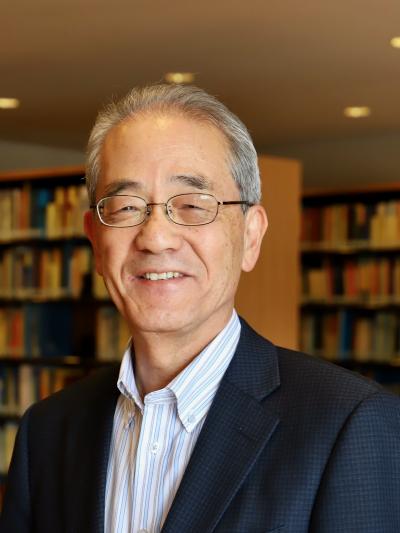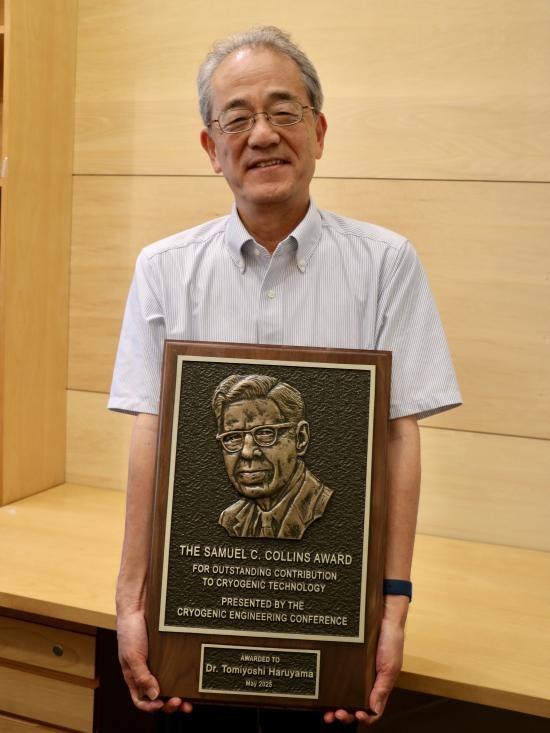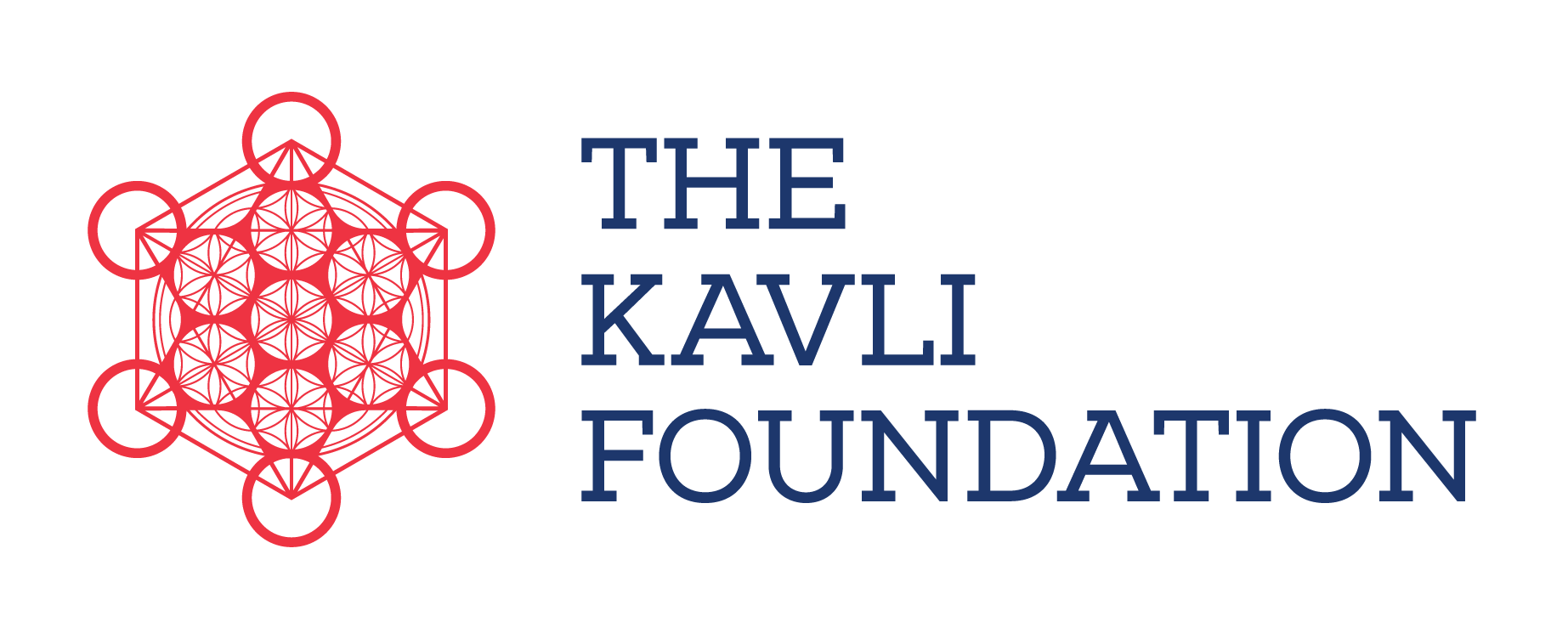14 February 2025
Kavli Institute for the Physics and Mathematics of the Universe (Kavli IPMU, WPI)

Kavli Institute for the Physics and Mathematics of the Universe (Kavli IPMU, WPI) Deputy Director Tomiyoshi Haruayama has been selected as both the 2024 Koshiba Prize and 2025 Samuel C. Collins Award recipient, it was announced by the Foundation for High Energy Accelerator Science on 7 February 2025, and Cryogenic Engineering Conference Awards Committee on 28 January 2025, respectively.
The Koshiba Prize was established by Japan’s High Energy Accelerator Science Foundation in honor of Japanese physicist Masatoshi Koshiba, who received the 2002 Nobel Prize in Physics for his pioneering work in neutrino astronomy, which he carried out using the Kamiokande detector.
The award recognizes researchers who have achieved outstanding originality and made internationally acclaimed achievements in the development and research of measuring instrument technology in the field of elementary particles and other basic sciences.
The Samuel C. Collins Award was established in honor of American physicist Samuel C. Collins, inventor of the first commercially available helium liquefier, and recognizes researchers who have identified and resolved cryogenic engineering problems and subsequently served the cryogenic community with their professional service and leadership.
For the Koshiba Prize, Haruyama his being recognized for his contributions to the “Development of a Pulse Tube Cryocooler for Large-Scale Liquid Xenon Particle Detection Experiments.” During his time as a researcher at Japan’s High Energy Accelerator Research Organization, Haruyama successfully developed an original pulse-tube cryocooler to cool large liquid xenon particle detectors used in particle physics experiments to 165 Kelvin.
In particle physics, a scintillation detector is commonly used to identify incident particles by capturing the light, called scintillation light, produced by the reaction of energetic particles or gamma rays with the detector when they are injected. Detector quality varies depending on what is used inside the detector to analyze the particles. Liquid xenon is favored by researchers because it can detect elementary particle reactions more precisely than detectors using crystals, and it uses less energy to generate photons.
However, liquid xenon was previously challenging to use in detectors because it was difficult to keep low temperature and pressure in a stable condition by using a cryogen like liquid nitrogen. Haruyama overcame this difficulty by developing a pulse tube cryocooler specific to the efficient liquefaction of xenon. Today, particle physicists around the world can use liquid xenon detectors in their search for rare particle decays and dark matter searches. Haruyama’s cryocoolers have been used in the muon rare decay search experiment (MEG) using 900 L of liquid xenon at the Paul Scherrer Institute in Switzerland for nearly 20 years, the dark matter search experiments at Gran Sasso in Italy for nearly 20 years (XENON), and at the Jingping Institute in China (PANDA-X). Those cryocoolers are still in operation, keeping liquid xenon at low temperature for a long time and data is being collected.
Haruyama has also made research and development in cryogenics, such as a liquid argon detectors, superconducting magnet cooling performance, and cryocoolers for a gravity wave detection. In addition, Haruyama has been a longtime active member in the cryogenics community, serving such as the Asian Editor of Cryogenics journal and the chairperson of the international cryogenic engineering committee, which has led to his recognition with both awards.
“The pulse tube cryocooler that has led to this Koshiba Prize is a homemade project I worked on with the engineers at the High Energy Accelerator Research Organization. Because of this cooler, large scale projects using liquid xenon have become possible, and continue to take data today. I look forward to hearing about when one of them makes a new discovery. I’m grateful to the Iwatani Industrial Gas Corporation Cryogenics group, which existed back then, and ULVAC Cryogenics who took over the business, for undertaking the technology transfer of our homemade cooler and turned it into a more reliable equipment for overseas use.
“The Samuel C. Collins Award is a great honor for the cryogenic community. Collins made many inventive efforts at MIT to realize a researchers’ dream. I’m very happy to know that in addition to my services to the international cryogenic community, also my part in developing a new technique to explore the mysteries of particle physics has been evaluated.” said Haruyama.
A prize ceremony for the Koshiba Prize will be held in Japan on March 5, and a prize ceremony for the Samuel C. Collins Award will be held in the US during the upcoming Cryogenic Engineering Conference (CEC) in the US between May 18 – 22.

Tomiyoshi Haruyama Education and Experience
1973 Bachelor of Science in Electrical Engineering, Keio University
1975 Technical officer, Tokyo University of Education
1977 Technical officer, University of Tsukuba
1985 Assistant Professor, National Laboratory for High Energy Physics
1989 Doctor of Philosophy in Engineering, Keio University
1990 Visiting Researcher, Institute of Cryogenics, University of Southampton
1996 Associate Professor, National Laboratory for High Energy Physics
2003 Professor, Institute of Particle and Nuclear Studies, High Energy Accelerator Research Organization
2010 Deputy Director, Institute of Particle and Nuclear Studies, High Energy Accelerator Research Organization
2013 Administrative Director, Project Professor, Kavli Institute for the Physics and Mathematics of the Universe, The University of Tokyo
2017 - Deputy Director, Kavli Institute for the Physics and Mathematics of the Universe, The University of Tokyo
Cryogenics experience
1997 – 2012 Asian Editor, Cryogenics (international journal)
2000 – 2007 Secretary General, International Cryogenic Engineering Committee
2006 – 2017 Board of Director, Cryogenic Association of Japan
2008 – 2012 Chair, International Cryogenic Engineering Committee
2010 – 2011 President, Cryogenic Association of Japan
Related links
2024 Koshiba Prize
Award recipients (Foundation for High Energy Accelerator Science) (Japanese)
Samuel C. Collins Award






